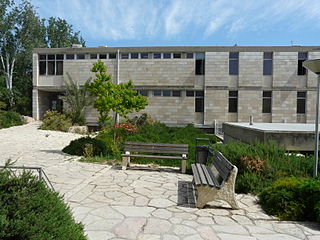Interdisciplinarity or interdisciplinary studies involves the combining of two or more academic disciplines into one activity. It draws knowledge from several other fields like sociology, anthropology, psychology, economics etc. It is about creating something by thinking across boundaries. It is related to an interdiscipline or an interdisciplinary field, which is an organizational unit that crosses traditional boundaries between academic disciplines or schools of thought, as new needs and professions emerge. Large engineering teams are usually interdisciplinary, as a power station or mobile phone or other project requires the melding of several specialties. However, the term "interdisciplinary" is sometimes confined to academic settings.
Biophysics is an interdisciplinary science that applies approaches and methods traditionally used in physics to study biological phenomena. Biophysics covers all scales of biological organization, from molecular to organismic and populations. Biophysical research shares significant overlap with biochemistry, molecular biology, physical chemistry, physiology, nanotechnology, bioengineering, computational biology, biomechanics, developmental biology and systems biology.

Computational physics is the study and implementation of numerical analysis to solve problems in physics for which a quantitative theory already exists. Historically, computational physics was the first application of modern computers in science, and is now a subset of computational science.

The Santa Fe Institute (SFI) is an independent, nonprofit theoretical research institute located in Santa Fe and dedicated to the multidisciplinary study of the fundamental principles of complex adaptive systems, including physical, computational, biological, and social systems. As of 2016, the Institute is ranked 20th among the world's "Top Science and Technology Think Tanks" and 23rd among the world's "Best Transdisciplinary Research Think Tanks" according to the Global Think Tank Report published annually by the University of Pennsylvania.
Engineering physics or engineering science refers to the study of the combined disciplines of physics, mathematics and engineering, particularly computer, nuclear, electrical, electronic, materials or mechanical engineering. By focusing on the scientific method as a rigorous basis, it seeks ways to apply, design, and develop new solutions in engineering.

Seth Lloyd is a professor of mechanical engineering and physics at the Massachusetts Institute of Technology. He refers to himself as a "quantum mechanic".
Julio César Gutiérrez Vega is a Mexican physicist who has done pioneering work on wave propagation of optical fields; in particular, he introduced the Mathieu family of non-diffracting optical beams and the Helmholtz-Gauss beams —a parabolic family of non-diffracting optical beams— with Miguel A. Bandrés. His research work is done with the Monterrey Institute of Technology and Higher Education’s Optics Center, of which he is the director. This work has been recognized with membership in Mexican Academy of Sciences and Level III membership in the Sistema Nacional de Investigadores.
The Institute for Biocomputation and Physics of Complex Systems (BIFI) is a research centre of the University of Zaragoza whose main objective is to apply computation to the physics of complex systems and biological models.
An academic discipline or academic field, also known as a field of study, field of inquiry, research field and branch of knowledge, is a subdivision of knowledge that is taught and researched at the college or university level. Disciplines are defined, and recognized by the academic journals in which research is published, and the learned societies and academic departments or faculties to which their practitioners belong. It includes scientific disciplines.

Ibercivis is a distributed computing platform which allows internet users to participate in scientific research by donating unused computer cycles to run scientific simulations and other tasks. The project, which became operational in 2008, is a scientific collaboration between the Portuguese and Spanish governments, but it is open to the general public and scientific community, both within and beyond the Iberian Peninsula. The project's name is a portmanteau of "Iberia" and the Latin word civis, meaning "citizen".
Theo Geisel is a German physicist. Geisel is director at the Max Planck Institute for Dynamics and Self-Organization and professor of theoretical physics at the University of Göttingen. His research is primarily concerned with the behavior of complex systems ranging from theoretical investigations in quantum chaos to nonlinear phenomena occurring in the brain.

The Max Planck Institute for the Physics of Complex systems is one of the 80 institutes of the Max-Planck-Gesellschaft, located in Dresden, Germany.
Roderick Melnik is a Canadian-Australian mathematician and scientist, internationally known for his research in applied mathematics, numerical analysis, and mathematical modeling for scientific and engineering applications.

Miguel Angel Fernández Sanjuán is a Spanish Theoretical Physicist from Leon, Spain. He is known for his contributions in nonlinear dynamics, chaos theory, and control of chaos, and has published several scientific papers and popular news articles. He has supervised around 20 PhD students in Nonlinear Dynamics, Chaos and Complex Systems.

The Racah Institute of Physics is an institute at the Hebrew University of Jerusalem, part of the faculty of Mathematics and Natural Sciences on the Edmund J. Safra Campus in the Givat Ram neighborhood of Jerusalem, Israel.
Peter David Drummond is a physicist and Distinguished Professor in the Centre for Quantum and Optical Science at Swinburne University of Technology.

The Pittsburgh Quantum Institute (PQI) is a multidisciplinary research institute that focuses on quantum sciences and engineering in the Pittsburgh region. It is a research-intensive cluster.

Sergej Flach is a theoretical physicist whose research has spanned a number of scientific fields in his career. With about 200 publications to his name, his research has been cited over 12,000 times giving him an h-index of 50 and i10-index of 149. He is a member of the American Physical Society, German Physical Society, Korean Physical Society, and New Zealand Institute of Physics. He is an editorial board member of Chaos (2016-) and was an editorial board member of Physical Review E (2009-2011).











